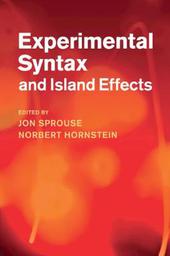
|
Experimental Syntax and Island Effects
Paperback / softback
Main Details
| Title |
Experimental Syntax and Island Effects
|
| Authors and Contributors |
Edited by Jon Sprouse
|
|
Edited by Norbert Hornstein
|
| Physical Properties |
| Format:Paperback / softback | | Pages:431 | | Dimensions(mm): Height 230,Width 150 |
|
| Category/Genre | linguistics
Grammar and syntax |
|---|
| ISBN/Barcode |
9781108790666
|
| Classifications | Dewey:415 |
|---|
| Audience | | Professional & Vocational | |
|---|
| Illustrations |
21 Tables, black and white; 37 Halftones, black and white; 30 Line drawings, black and white
|
|
Publishing Details |
| Publisher |
Cambridge University Press
|
| Imprint |
Cambridge University Press
|
| Publication Date |
12 December 2019 |
| Publication Country |
United Kingdom
|
Description
This volume brings together cutting-edge experimental research from leaders in the fields of linguistics and psycholinguistics to explore the nature of a phenomenon that has long been central to syntactic theory - 'island effects'. The chapters in this volume draw upon recent methodological advances in experimental methods in syntax, also known as 'experimental syntax', to investigate the underlying cognitive mechanisms that give rise to island effects. This volume presents a comprehensive empirical review of a contemporary debate in the field by including contributions from researchers representing a variety of points of view on the nature of island effects. This book is ideal for students and researchers interested in cutting-edge experimental techniques in linguistics, psycholinguistics and psychology.
Author Biography
Jon Sprouse is an Associate Professor of Linguistics at the University of Connecticut. Norbert Hornstein is a Full Professor in the Department of Linguistics at the University of Maryland, College Park.
Reviews'This important collection of papers demonstrates the utility of experimental syntax by elucidating the debate about the nature and source of syntactic island effects concerning the interaction of the grammar and the processor, thereby providing an excellent introduction to a new avenue for syntactic research.' Robert Freidin, Princeton University, New Jersey
|